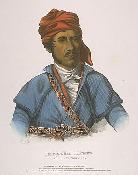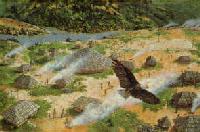
Timpoochee Barnard

"That they were a distinct people is known from their insistence on descent from the Sun, a hold over from the mound building Sun worship. While they lived among several other tribes, they remained distinct and held themselves separate. More important the Uchean language has never been certainly classified, and bears little resemblance to any of the known tongues of the Americas. Only a half dozen speakers of the Uchean language remain alive. The Yuchi long built their homes half subterranean with palisaded walls around the village. They buried their dead laid out flat, often within wooden or stone lined pits. It is cultural traits like these that distinguishes their archaeological sites from their neighbors."
"The Indian removal was the beginning of the end for the Yuchi tribe. Some Yuchi fled to Florida and joined the Seminole, where Uchee Billy was Chief a century ago. Others of mixed heritage successfully "passed as white," and remained on their land. However, this required hiding all evidence of their Indian heritage." . . . . "Today, the tribal Yuchi number a few hundred and are partly assimilated into the Creek and Seminole Nations."
"In summary, the Yuchi language is nearly extinct with less than a dozen speakers. The tribe was expelled from East Tennessee before the settlers begin to record the area's history. Reduced to only a small tribe, they were largely ignored by scholars. It is little wonder that their tie to this State (Tennessee) and its name has been nearly lost to us. Just a forgotten tribe and a nearly meaningless name hidden in a few musty records. If we ignore the Yuchi long enough they will be extinct, and therefore one less Indian problem to concern an arrogant majority bent on reducing them to naught but forgotten myths."

Following Report is posted on TNGenWeb.org
Bureau of Indian Affairs TECHNICAL REPORT II Historical Background |
Interesting note:
Gujjars
(of India) are also identified with the Kushans of Yuchi, a tribe of
Tartars.
 Return to
Indigenous Peoples' Literature
Return to
Indigenous Peoples' Literature
Compiled by: Glenn Welker
Copyright © 1993-2013
This page last updated 12/19/2013 01:09:51
This site has been accessed over 10,000,000 times since February 8,
1996.